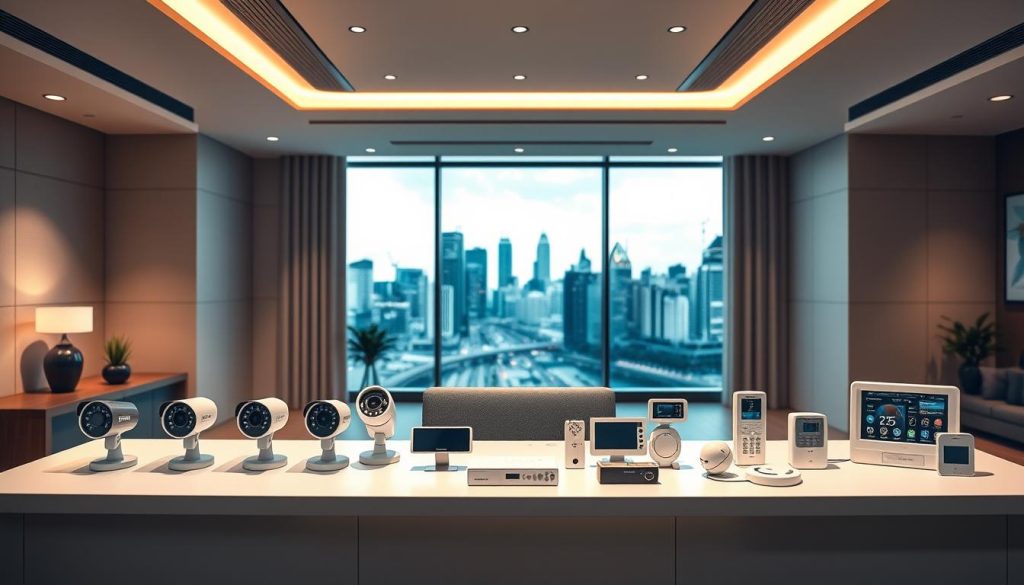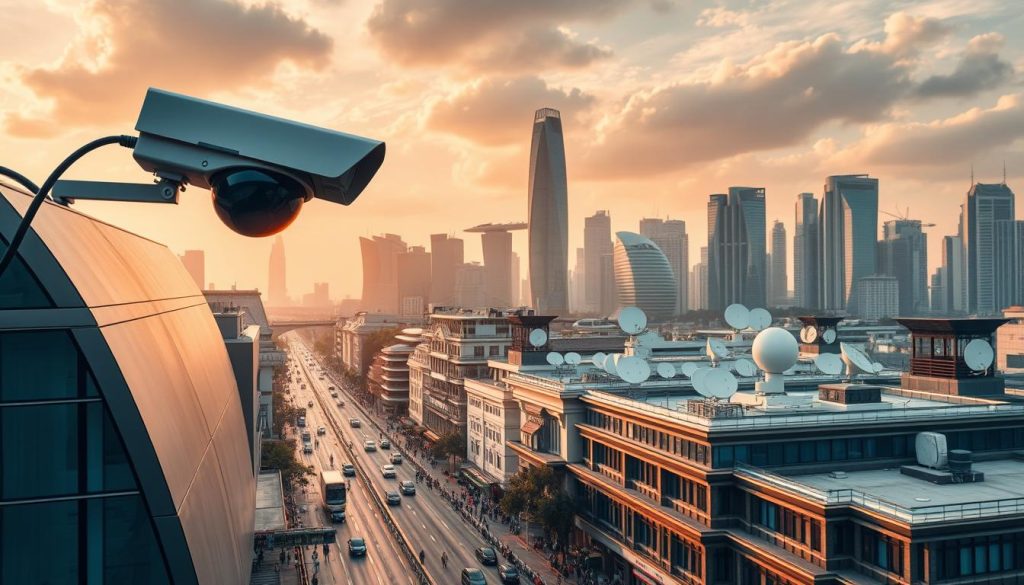Singapore’s demand for advanced security solutions is growing rapidly. The global market is projected to hit $105.2 billion by 2029, driven by smart city initiatives and rising safety concerns. Modern security systems now integrate AI analytics and IoT for better monitoring.
Starting a security-focused venture here offers great potential. However, challenges like PDPA compliance and system integration must be addressed. Using field management tools, such as ReachOut, can streamline operations and boost efficiency.
Singapore’s tech-friendly environment supports innovation in this sector. High safety standards and smart infrastructure create opportunities for businesses offering reliable security solutions.
Key Takeaways
- Singapore’s security market is expanding, with global projections reaching $105.2 billion by 2029.
- AI and IoT integration enhance modern security systems.
- PDPA compliance and data storage are critical challenges.
- Field management software improves operational efficiency.
- Smart city initiatives provide strategic advantages.
Why Start a CCTV Camera Installation Business in Singapore?
Singapore’s urban landscape is increasingly adopting smart security measures. With property values rising and safety concerns growing, reliable monitoring tools are no longer optional—they’re essential.
Growing Demand for Security Solutions
Modern security systems now offer features like 4K resolution and color night vision, which are becoming standard expectations. HD cameras cost 40% less than in 2020, making them more accessible.
Cloud-based storage is another game-changer. A staggering 68% of new setups now use it, ensuring data is secure and easily accessible. This shift reflects Singapore’s push toward smarter, scalable safety measures.
Technological Advancements Driving the Industry
AI-driven analytics reduce false alarms by 62% in commercial areas, saving time and resources. These systems learn patterns and flag only genuine threats.
Integration with IoT devices—like smart locks and building management networks—creates seamless safety ecosystems. For example:
“NCS Singapore’s smart city surveillance network demonstrates how AI and IoT can enhance public safety while maintaining privacy.”
Such innovations position Singapore as a leader in next-gen security solutions.
Understanding the CCTV Market Landscape
The security industry in Singapore is evolving with cutting-edge surveillance innovations. Commercial clients drive 73% of revenue, while residential projects average SGD 2,800 per job. Tailored service packages now address niche needs, from condo intercoms to logistics hubs.
Key Trends in Surveillance Technology
AI-powered analytics reduce false alarms by learning behavioral patterns. IoT integration enables devices like smart locks to sync with monitoring systems seamlessly.
Retailers use heat mapping to optimize store layouts, while logistics parks deploy license plate recognition. Government projects require IMDA-certified equipment, ensuring secure network infrastructure.
Target Markets: Residential vs. Commercial
Homeowners prioritize discreet setups, like balcony placements or intercom-linked systems. Predictive maintenance alerts ensure long-term reliability.
Commercial spaces demand scalable solutions for high-traffic areas. Data centers and dispensaries represent emerging niches with specialized needs.
Essential Steps to Launch Your CCTV Installation Business
Specialized security solutions are reshaping Singapore’s safety standards. To stand out, focus on strategic planning and niche expertise. Start by analyzing gaps in the market and tailoring offerings to high-value clients.
Conducting Market Research and Competitive Analysis
89% of premium clients expect a 2-hour response for critical system failures. This underscores the need for reliable maintenance plans. Study competitors’ strengths—like Axis Communications’ partner program—to identify untapped opportunities.
Key areas to explore:
- Marine sector demand (e.g., PSA terminals requiring rugged setups).
- Commercial clients prioritizing cloud-based access and AI analytics.
- Residential preferences for discreet, smart-home-integrated systems.
Defining Your Niche and Services
Recurring revenue models, like 24/7 monitoring at SGD 120/month per device, ensure steady cash flow. Consider add-ons such as:
“Cybersecurity audits and staff training workshops differentiate premium brands in crowded markets.”
Partner with trusted suppliers to offer cutting-edge solutions. For example, Axis provides technical support and co-marketing for certified partners.
Legal and Regulatory Requirements in Singapore
Navigating Singapore’s legal framework for security providers requires precision. The city-state enforces strict protocols to balance safety with individual rights. Non-compliance risks hefty fines or operational shutdowns.
Licensing and Permits
All surveillance operators must register with the Police Licensing & Regulatory Department (PLRD). Key rules include:
- Place cameras at least 1.5 meters from neighbor boundaries to respect privacy.
- Obtain SPF approval for public-space installations.
- Use IMDA-certified network equipment for encrypted footage transmission.
Compliance with Privacy Laws
Singapore’s PDPA mandates rigorous data handling. Unauthorized access to footage can trigger fines up to 10% of annual revenue. Essential safeguards:
“Hikvision’s iSecure Center tiers employee access, ensuring only authorized personnel view sensitive recordings.”
Retain footage for 30 days minimum—aligning with SPF investigation windows. Cloud storage solutions must meet IMDA’s AES-256 encryption standard.
Building Your CCTV Business Infrastructure
The backbone of any reliable security operation lies in robust technical foundations. Choosing the right components ensures scalability and compliance with Singapore’s stringent standards. Cloud adoption has surged 47% since 2022, reflecting a shift toward flexible, cost-efficient solutions.
Sourcing High-Quality Equipment and Suppliers
Partner with vendors offering IMDA-certified hardware for seamless integration. Fiber optic cabling suits industrial parks with high bandwidth needs, while Cat6 cables balance cost and performance for smaller sites.
StarHub’s Business Cloud Surveillance packages provide end-to-end solutions, from hardware to encrypted data storage. Hybrid systems—combining local NVRs with Azure cloud backups—reduce downtime risks.
Choosing Between Wired and Cloud-Based Systems
Wired setups excel in high-security zones but require upfront cabling investments. Cloud-based systems offer remote access and 22% lower 3-year TCO, ideal for multi-site clients.
“Hybrid architectures future-proof operations by blending on-premise control with cloud scalability.”
For cybersecurity, configure VPNs to protect network traffic. Regular firmware updates and role-based permissions further safeguard sensitive footage.
Pricing Strategies for Your CCTV Services
Smart pricing models can make or break your security venture in Singapore’s competitive market. Clients increasingly expect transparent cost structures paired with scalable solutions. The Platinum Care package at SGD 999/month for 24 cameras demonstrates how tiered offerings cater to diverse budgets.

Cost Breakdown: Equipment, Labor, and Overhead
Commercial projects typically allocate 45% of budgets to IMDA-certified hardware. Fiber optic cabling adds 15-20% to material costs but ensures future-proof infrastructure. Labor constitutes 30%, with skilled technicians commanding SGD 35-50/hour for complex setups.
Overhead includes 24/7 monitoring dashboards and encrypted cloud storage. Partnering with business security solutions providers can reduce operational costs by 18% through bulk purchasing.
Creating Competitive Service Packages
Tiered packages from Basic (8 cameras) to Enterprise (50+) allow clients to scale as needed. Value-added features drive retention:
“Bundling Ensign InfoSecurity’s threat monitoring increases average contract values by 22% while reducing client cybersecurity risks.”
Response time SLAs differentiate premium brands—4-hour emergency fixes versus next-business-day maintenance. Loyalty perks like bi-annual lens cleaning build long-term relationships with residential clients.
Marketing Your CCTV Camera Installation Business
Singapore’s property managers influence 82% of security system referrals, making targeted outreach essential. A blend of digital visibility and local alliances ensures steady client acquisition in this competitive sector.
Digital Strategies: SEO and Social Media
Optimize your website for keywords like “smart surveillance solutions” to rank higher in local searches. Case studies showcasing AI-powered analytics perform 3x better in engagement than generic ads.
LinkedIn campaigns targeting facility managers yield a 40% higher conversion rate compared to broad audiences. Regular posts on license plate recognition or heat mapping establish thought leadership.
Local Networking and Partnership Opportunities
Join SISV to access tender opportunities for government projects. Co-marketing with tech providers like Cisco Meraki amplifies credibility for converged systems.
BCA-approved builders (e.g., Tiong Seng) often seek trusted partners for integrated service packages. Hosting workshops at HDB Hub on topics like “Shop House Security” builds community trust while generating leads.
“A single partnership with a marine logistics firm can unlock 15+ commercial projects annually through word-of-mouth referrals.”
Leveraging Technology for Efficient Operations
AI-driven tools are revolutionizing how security teams manage workflows and respond to incidents. By automating routine tasks, these solutions free up resources for critical monitoring and client support. Singapore’s tech-savvy market demands such innovations to stay ahead of evolving threats.
Field Service Management Software Benefits
Platforms like ReachOut reduce response times by 35% through GPS-tracked dispatches. Real-time job tracking ensures technicians arrive equipped with the right tools for each task.
Uptime guarantees backed by Dynatrace monitoring minimize system failures. Predictive alerts flag hardware issues before they disrupt service, saving clients an average of SGD 4,200/month in false alarm costs.
AI and IoT Integration for Advanced Solutions
Smart systems now learn from patterns to optimize performance. For example:
- BriefCam’s video analytics detect crowd anomalies in retail spaces.
- Siemens Desigo CC integrates surveillance with building HVAC and lighting.
“Axis device sensors predict maintenance needs, reducing downtime by 62% in commercial sites.”
These technologies create seamless, self-improving security ecosystems tailored to Singapore’s smart infrastructure.
Scaling and Future-Proofing Your Business
Singapore’s security sector is evolving with new technologies like drone surveillance—91% of top providers plan adoption by 2026. Staying ahead means embracing innovation and strategic growth.
Expand regionally through partnerships, like Malaysia joint ventures via IE Singapore. Invest in workforce development with SP Continuing Education courses for specialized skills.
Leverage R&D tax incentives to develop AI-driven features. ESOP models help retain skilled technicians, ensuring long-term success.
Adapting to trends and building scalable systems keeps your business competitive. Focus on smart solutions that align with Singapore’s tech-forward landscape.

